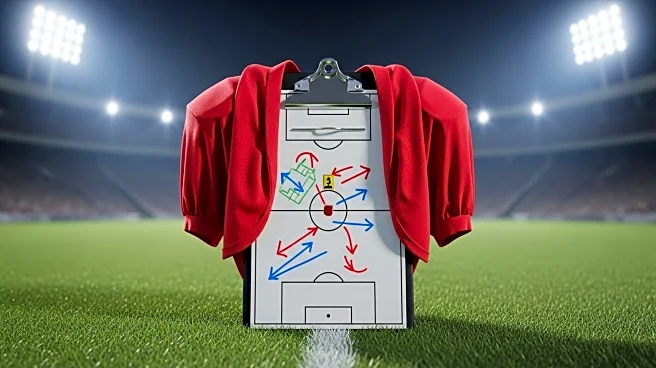What's Happening?
Manchester United is grappling with the challenge of integrating Bruno Fernandes into their current system under manager Ruben Amorim. Despite Fernandes' impressive individual statistics, including 19 goals and 19 assists last season, the team has struggled, finishing 15th in the Premier League and facing a humiliating Carabao Cup exit against Grimsby Town. Amorim's commitment to a 3-4-3 formation, which requires dynamic and athletic players, has raised questions about Fernandes' fit within the team. His lack of tactical discipline and defensive capabilities have been highlighted as potential issues, with comparisons drawn to Christian Eriksen's later years at Tottenham. The debate continues on whether Fernandes is a square peg in a round hole, despite his contributions.
Why It's Important?
The situation with Bruno Fernandes is significant for Manchester United as it highlights the broader challenges of team dynamics and player compatibility within specific tactical systems. Fernandes' role is crucial, given his contributions to the team's offensive play, but his inability to fit seamlessly into Amorim's preferred formation could impact United's overall performance. The club's reliance on Fernandes for creativity and goal-scoring underscores the need for a balanced team structure that can support his strengths while mitigating weaknesses. This dilemma could influence future transfer decisions and the strategic direction of the club, affecting its competitiveness in domestic and international competitions.
What's Next?
Manchester United may need to consider adjustments to their squad or tactical approach to better accommodate Fernandes' style of play. Potential transfers, such as acquiring more athletic midfielders, could be explored to enhance team dynamics. The ongoing interest from Saudi Pro League clubs in Fernandes presents an opportunity for United to reassess their strategy and possibly rebuild the squad with the funds from a transfer. Manager Ruben Amorim's future decisions regarding team formation and player roles will be crucial in determining the club's path forward.
Beyond the Headlines
The situation with Fernandes also touches on the cultural and emotional aspects of football, including player loyalty and the pressures of leadership. Fernandes' emotional responses during challenging matches have been criticized, highlighting the psychological demands on players in high-stakes environments. The debate over his role reflects broader themes in sports management, such as balancing individual talent with team cohesion and the ethical considerations of player transfers.











